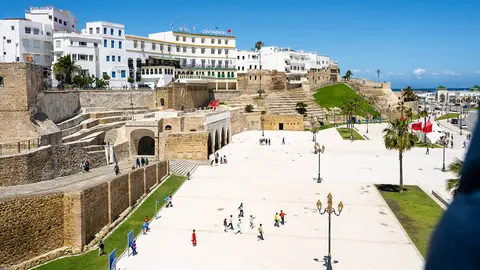Domestic tourism in Morocco threatened by illegal guards in tourist areas

However, this season is also seeing the proliferation of ‘parasitic’ activities that take advantage of Moroccan tourists' pockets without legal backing and ruin their holidays.
While the problem of car guards, also known as ‘yellow vests’, is criticised throughout the year — leading, for example, to the Casablanca City Council considering regulating them through a set of specifications, which sparked controversy as it was seen by many citizens as ‘legalising chaos’ — the phenomenon worsens in summer, when some of these ‘guards’ (known as kardiyanat) decide to invade coastal and tourist areas to impose ‘almost compulsory’ fees on holidaymakers, with exorbitant prices.
In this context, the president of the National Association for the Protection of Public Property, Abdelali Sellali, stated that this phenomenon constitutes ‘a form of occupation of public space’, adding that it causes unrest among citizens and challenges the authorities, who tend to be sympathetic to those who practise it, on the pretext that it is seasonal work.
The activist explained that, after investigating this situation, it has been discovered that these ‘guardians’ are divided into two groups: individuals working alone, which is less dangerous, and others who form ‘organised gangs,’ in his words, and take turns in the areas. ‘They also gang up on their victims and impose abusive fees. Those who refuse to pay are subjected to verbal and physical violence or even sabotage of their vehicles...’.
Sellali warned that this type of practice is no longer limited to urban or rural areas and that it is particularly prevalent in tourist areas during the high season, posing a direct threat to domestic tourism.
It is no longer just a matter of watching over parked cars, but some even go so far as to block roads and access points, charging even vehicles that just want to pass through. ‘Every car that passes must pay a fee of 15 dirhams (1.42 euros). Imagine how much can be collected daily with this practice,’ said Sellali.
He explained that the association has identified this type of behaviour mainly at access points to beaches and forests: ‘We have detected revenues of no less than 10,000 dirhams (945 euros) per day, as these individuals control a specific area, close all access points and leave only one entrance, forcing any car that wants to pass to pay at least 10 dirhams (0.95 euros).’
The activist pointed out that the association has been sending letters to the authorities alerting them to these practices, ‘but we have noticed a certain leniency on the part of the authorities, who respond by saying that this is seasonal work and that these guards only thrive in the summer months.’
Sellali advised citizens who are victims of this type of extortion to contact the police or the royal gendarmerie: ‘Because public property belongs to all citizens, it is not for sale or rent,’ emphasising that the Penal Code provides for penalties for those who engage in extortion, place barriers on public roads or usurp functions, all of which are clear offences committed by those who engage in these practices.



